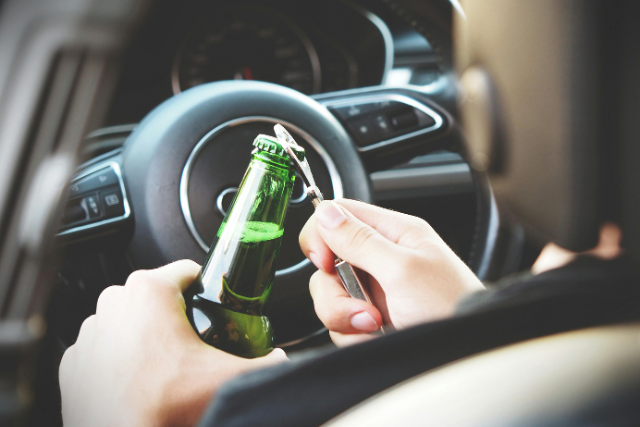Picture this. You’re out for a celebratory dinner, have a couple cocktails and get in your car to leave. You’re driving carefully on a New Jersey road when you see flashing red lights in your rear-view mirror. Are you obeying NJ DUI laws? Were you speeding? Did you fail to make a complete stop? Something as minor as a broken blinker can turn into a DUI arrest. So, what should you do when you get pulled over and are facing NJ DWI penalties?
What to Do When Facing a DUI Arrest
Under New Jersey law, it is illegal to operate a motor vehicle or any other motorized vehicle, including a bicycle, while under the influence of either alcohol or mind altering drugs; whether legal or illegal. Such illegal drugs include THC, marijuana and even over-the-counter and/or prescription medication. Just as the consumption of alcohol can cause drowsiness, vision impairment, lack of coordination and slurred speech, other substances can also cause such side effects and would be a violation of New Jersey law.
If you find yourself being pulled over by a law enforcement officer after consuming alcoholic beverages or after ingesting other substances, following the suggestions below will provide you and your attorney with the best case scenario and best chances of defending a Driving While Intoxicated or Driving While Under the Influence charge.
Step 1. Pull over carefully.
As in any other traffic stop by law enforcement, you should put your blinker on immediately to inform officer that you are acknowledging his presence and complying with his lawful command to pull over. You should thereafter pull over as soon and as safe as practicable on the side of the road or highway.
Step 2. Stay inside your vehicle.
As in any other traffic stop by law enforcement, you should never leave your vehicle unless instructed specifically to do so by the law enforcement officer. In order to decrease any suspicion by the officer, you should immediately open your window upon being pulled over and placed both of your hands on the steering wheel as the officer approaches your vehicle. This is for your safety and the officer’s safety. You should NOT start fumbling around inside the vehicle for your credentials or anything else. Such conduct could potentially lead the officer to believe that you are attempting to hide contraband. Then, when the officer asks you for credentials, advise him as to what part of your vehicle or your body you are intending to access so the officer is not startled when you reach for your glovebox or inside your coat pocket, etc.
Step 3. Stay calm and polite.
Although we all get nervous when pulled over by the police, it is important to remain calm and cordial with the law enforcement officer. At this point during a traffic stop, any inappropriate gestures, comments or anger merely will raise the suspicion of an officer and could lead to both an escalation of the traffic stop as well as an increase of the motor vehicle charges you will receive. Further, you could incriminate yourself without you knowing. As such, avoid negative communication and answer all questions asked.
Step 4. Perform the field sobriety tests if requested.
If, during your traffic stop, the law enforcement officer has an articulable suspicion that you are operating your vehicle under the influence of alcohol or and other mind altering substance, he has the right, pursuant to New Jersey law to ask you to perform field sobriety testing. The field sobriety testing typically includes a nystagmus test of your eyes, a walk and turn test and a leg raise test. In the event you have any issues with your eyes or physical impairments of your legs you should immediately inform the officer of same. If you perform poorly on these tests, the officer then has the right to effectuate a legal arrest and transport you to the local police department for purposes of having you perform a blood alcohol breathalyzer test.
Step 5. Always take the breathalyzer test
If you are placed under arrest and brought to a police station, you should always take the breathalyzer test. First, your refusal to take a breathalyzer test will typically result in a conviction for refusal which carries either the same or greater penalty than DWI. Second, by taking the breathalyzer test, you provide your attorney with a chance to effectively challenge the breathalyzer test results which could result in a lesser sentence or even a dismissal of the DWI charge.
It is important at this point in time to note that even if your breathalyzer shows a 0.0% alcohol reading, the field sobriety test failure further allows the officer to perform a Drug Recognition Analysis to determine if you are under the influence of any other mind altering drugs. Such Analysis includes other psychomotor testing.
Step 6. Hire a DWI lawyer
Because DWI penalties are expensive, can restrict your ability to drive and may result in jail time, you will want appropriate and aggressive legal representation to protect your interests. Such representation can often convince the court to have the charges dismissed or downgraded. Further, New Jersey statutes also presently allow for the installation of an interlock device on your vehicle which allows you to continue to operate a motor vehicle despite a DWI conviction. Accordingly, whether you are looking at a first, second or third DWI defense, you should ensure that you have appropriate legal representation to minimize any fines, driving restrictions and jail time.

